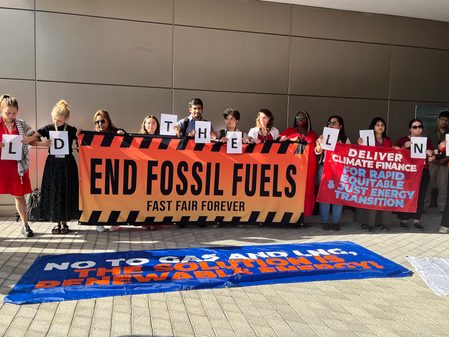SUMMARY
This is AI generated summarization, which may have errors. For context, always refer to the full article.

DUBAI, United Arab Emirates – The COP28 climate talks went into overtime on Tuesday, December 12, as countries engaged in shuttle diplomacy to bridge deep international divisions over how to deal with fossil fuels in the summit’s final text.
Where the conference lands on the issue will send a powerful message to global investors and markets about the ambition of governments around the world to end the use of oil, or preserve a future place for it.
Many nations had criticized a deal draft released on Monday, December 11, for failing to call for a “phaseout” of fossil fuels, which scientists say are by far the biggest source of the greenhouse gas emissions driving global warming.
More than 100 countries ranging from the United States and the EU to tiny island nations had pushed for the language, but came up against strong resistance from members of the Organization of the Petroleum Exporting Countries (OPEC) and its allies.
The United Arab Emirates’ COP28 Director General Majid Al Suwaidi said the aim of the Monday text was to draw negotiators from the nearly 200 countries at the Dubai summit to reveal their demands and move the discussion forward.
“By releasing our first draft of the text, we got parties to come to us quickly with those red lines,” he told reporters.
Al Suwaidi said the COP28 presidency was aiming for a “historic” result that included mentioning fossil fuels – but that it was up to countries to agree.
Deals at United Nations climate summits must be passed by consensus, at which point individual countries are responsible for delivering the deal through national policies and investments.
Germany’s climate envoy, Jennifer Morgan, said the talks had now entered a “critical, critical phase.”
“There is a lot of shuttle diplomacy going on,” she said on X, formerly known as Twitter, referring to fast-paced meetings between countries to hunt for compromise.
US Special Climate Envoy John Kerry popped out of one meeting with representatives from several other delegations late on Tuesday and said he believed the fossil fuel language in the COP28 deal text was getting stronger.
“I think there’s progress and moving in the right direction. And you know, we’re going to keep working through the night,” he told reporters.
A new draft text for a final deal was expected in the early hours of Wednesday, December 13, with a potential plenary meeting to finalize a deal later in the day.
The draft released on Monday had suggested eight options countries “could” take to cut emissions.
One was “reducing both consumption and production of fossil fuels, in a just, orderly, and equitable manner so as to achieve net zero by, before, or around 2050.”
That would be the first time in history that a UN climate summit has mentioned reducing use of all fossil fuels. But it would fall short of the “phaseout” of coal, oil, and natural gas scientists say must happen soon to avoid climate change escalating.
The COP presidency had hoped to wrap the two-week summit up by Tuesday morning, but clashes over the deal text forced negotiations into overtime. COP summits rarely finish on schedule.
A COP28 spokesperson said UAE’s COP28 President Sultan al-Jaber would be taking meetings until 2300 GMT as he searched for a compromise deal.
‘Worried’
Sources familiar with the discussions said Jaber had faced pressure from Saudi Arabia, de facto leader of the OPEC oil producers’ group to which the UAE belongs, to drop any mention of fossil fuels.
Saudi Arabia’s government did not respond to requests for comment on Tuesday.
In a Wednesday, December 6, letter seen by Reuters, OPEC Secretary General Haitham Al Ghais urged members to reject any COP28 deal that targeted fossil fuels.
Negotiators and observers in the COP28 talks told Reuters that while Saudi Arabia has been the strongest opponent of anti-fossil fuel language in the text, other OPEC and OPEC+ members, including Iran, Iraq, and Russia, have also resisted a fossil fuel phaseout deal.
“I’m worried…because it’s very obvious that we need more ambition,” Denmark’s Global Climate Minister Dan Jorgensen told Reuters. “I haven’t given up yet of course, we still think this is possible.”
The Monday draft was criticized as too weak by many participants such as Australia, Canada, Chile, Norway, the European Union, and the United States, among the 100-strong group demanding a firm commitment to wean the world off coal, oil, and gas.
Despite the rapid growth of renewable energy in recent years, oil, gas, and coal still produce about 80% of the world’s energy.
Some African nations said any deal must require wealthy countries, who have long produced and used fossil fuels, to quit first.
“The transition should be premised on differentiated pathways to net zero and fossil fuel phasedown,” said Collins Nzovu, minister of green economy for Zambia, which chairs the African Group of countries in UN climate talks.
“We should also recognize the full right of Africa to exploit its natural resources sustainably,” he added.
It was unclear if China, the world’s top greenhouse gas emitter, supported Monday’s draft. Its veteran climate change envoy, Xie Zhenhua, said progress was being made in the talks, but it was “hard to say” whether agreement could be reached by the end of Tuesday.
Representatives of small island nations said they would not approve a deal that was a “death warrant” for vulnerable countries hit hardest by rising sea levels. – Rappler.com
Add a comment
How does this make you feel?






There are no comments yet. Add your comment to start the conversation.